Stories of Community Radio in East Africa: Powerful Change by Birgitte Jallov
Stories are a powerful way to monitor change and the impact of development. So, I would like to tell you a story about social change in East Africa. I base my story on an analysis—using “most significant change” methodology—of more than 100 stories my colleague Charles Lwanga-Ntale, a regional researcher, and I heard when talking with people of East Africa in 2007.
Men and women were eager to tell us their stories about three pilot community radio stations and how these stations had caused powerful, positive social change in the regions where they broadcast. Their stories reflect hope and empowerment; stories to learn from, grow from and celebrate.
We heard from people in three communities, each with a pilot community radio station. The stations and their locations are: 1) women-run Radio Mang’elete, in southeastern Kenya; 2) ORS FM, serving Maasai people in northern Tanzania; and 3) KKCR radio, broadcasting to a rural community near a conflict zone in southwestern Uganda.
The East African Community Media Project (EACMP), an initiative to increase community development and empowerment, supported and coordinated development of the three stations.
Radio Mang’elete
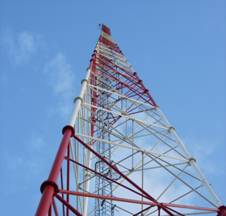
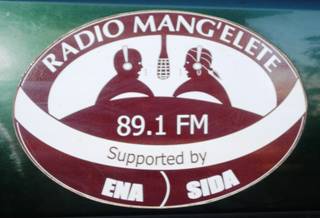
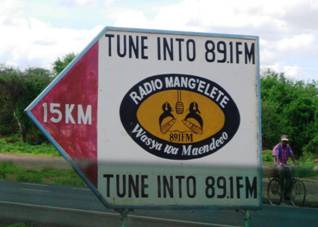
Radio Mang’elete, Nthongoni, Kenya, began broadcasting in 2004. When we analysed the stories people in the area told us about the radio station’s impact, the top three areas of impact that people agreed on were: 1) Achieving social and economic equality of women and providing opportunity to voice their issues and concerns; 2) improving awareness and attitudes; and 3) reducing poverty.
Evidence of Change 1. Achieving social and economic equality for women and providing opportunity to voice their issues and concerns
One woman summed Radio Mang’elete’s impact this way:
Women are now respected, are moving into public life, have started trading. Our daughters go to school, instead of being married off much too young! Now we are seen as real human beings.
In Ivingoni village the chairperson of the women’s group said:
The radio has created a very good feeling about ourselves. I am saying this with particular reference to the status of women in our community. We might not be rich or powerful. We might not even be famous. However, we have all of a sudden, gained recognition, starting from the family and household level all the way up to the district and national levels.
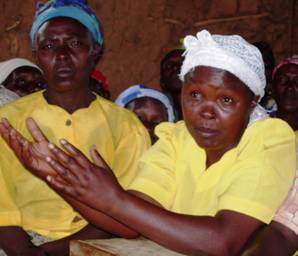
Women in a discussion group in the village of Matangini spoke about how the radio had impacted an issue that was difficult for them to discuss and filled with deep frustration and pain. Here’s how one woman put it:
One of the least talked about challenges which women in this community used to face before Radio Mang’elete came was the high rate of rapes, defilement and other forms of sexual harassment. From childhood, women in our community are taught not to speak out openly about these kinds of acts. The situation even used to be more challenging if the offending party was an older member of the household—sometimes the head of household. In such instances the “normal practice” was to simply keep quiet and not to “‘put to shame”’ the household head. RM has changed all that. The voice of women, in general, and girl children in particular, is now heard loud and clear. Sexual harassment, incestuous relationships, rape and defilement have dramatically reduced, and men are now more positive and sensitive to the needs of girl children.
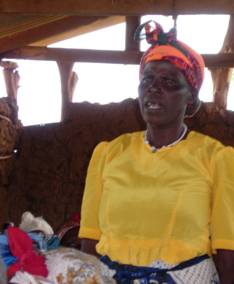
Another woman told how Radio Mang’elete had improved women’s status:
The status of women both at household and community levels has improved a lot. Men used to despise us, saying that there is nothing big that we can do. Now everyone knows that Radio Mang’elete was established mainly because of the efforts of women, and we feel very proud about this.
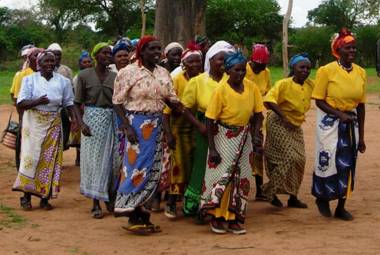
Evidence of Change 2. Improved awareness and attitudes
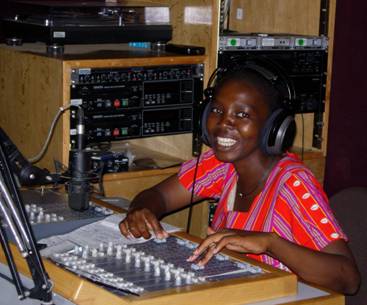
Women in Ivingoni village spoke of another important change—new awareness and attitudes growing out of the higher level of information and communication provided by the radio station.
The biggest change is the change in people’s attitudes and insight brought about by the community radio. The way the radio presents different development issues is very practical, very concrete, very much linked to our life and experiences here. Before, and in other media, such information came to us in abstract terms. It was information, which was being communicated by a stranger in Nairobi. In Radio Mang’elete the information is not only being relayed by our own sons and daughters, but it is also being communicated in our local language, and if we want, we can go to the radio station and either contest what the presenters were saying or make a further contribution to the presentations.
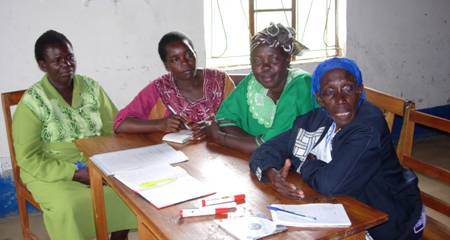
Women from Nthongoni village working at the radio station shared their experiences: One told us:
Before the radio was in place, politicians would give incredible promises. Now they give fewer empty promises. They know they will have to answer questions later! Also the way they work with us, their community, is a lot more respectful. Before, for instance, they would close the community boreholes, so that they could sell water to us from their own borehole. When one of them did it here, after the radio went on air, we covered in on the radio, explained what he had done, what it meant to us—and that he had no right to do what he did. He got furious, and threatened to take us in the radio to court. When he cooled down he realised that he had no case—not to win, anyway. And we are sure that such things won’t happen again. And if they do, we are there!
Evidence of Change 3. Reduced Poverty
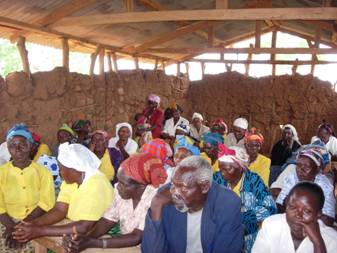
Other women said the issue of alcohol consumption had been so successfully dealt with by the radio that it needed to stand out on its own as the most significant change that had happened to the people of Akambaland. One woman said:
Drinking for our men was like a full-time job, and some even took pride in drinking from different locations and failing to find their way home. If they ever found their way home they would either harass the woman and her children or simply go to sleep without even knowing the conditions at home. Our men have actually started taking liquor mixed with certain chemicals (to make it more potent).
A woman who had stopped drinking after listening to the radio programmes, said:
Even women had joined in these free-drinking-sessions. Many of us simply drank without thinking about the implications of this to our personal lives. We sometimes consumed large amounts of alcohol without remembering to wear our knickers. This put many women at risk of being sexually assaulted.
And a third woman said:
On a scale of 1-100 we would say that the problem of alcoholism has been overcome up to 85 percent.
Women of Matangini spoke of the many ways Radio Mang’elete changed their lives: One said:
It is now difficult for one’s livestock, or even children, to be stolen, or to simply get lost. As soon as you realise that something is missing, you send someone on a bicycle to take an announcement on the radio, giving your details. Often in a very short span of time another announcement is aired giving you details about your lost livestock or child.
Another said:
We used to spend large amounts of money to send announcements to Kenya Broadcasting Corporation (KBC) in Nairobi. Even after you had done so, an announcement would come very late, or not at all, it would be in Swahili which most of our people do not understand well, and it would have cost you a fortune.
Others told of additional positive changes:
The mere idea of a radio being located and organised from among us is like a miracle. Only God could have done this for us. Some of us would have died without ever knowing how radio works. If we died today after this achievement, our souls would rest in total peace.
Learning about HIV and AIDS has been the most important thing for me. “Having lost at four children and a number of relatives, I have now graduated from being a feeling of desperation which I had in the beginning to a feeling of hope.”
Prior to the starting of Radio Mang’elete broadcasts, we had lost many young people to drugs. Through innovative programmes which also involves the youth themselves, and by linking up the programmes on youth with those on health, HIV/AIDS, and livelihoods, many youth have come back to the mainstream.
Through the programmes on environmental education and agriculture experts and practitioners tell about current challenges to farmers such as soil erosion, deforestation, soil fertility, etc.
The sales of small traders in our local communities have increased as a result of the radio. The traders can now afford the more reasonable charges for advertising their goods.
Radio ORS FM
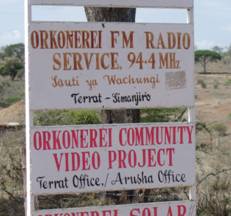
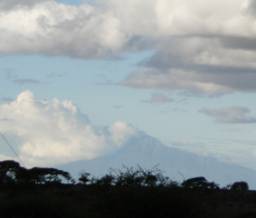
Radio ORS FM, broadcasting from Terrat, Tanzania, is a Maasai station operating in the shadow of Mount Kilimanjaro. Our analysis of stories the Maasai told highlight three key changes ORS FM brought about: 1) improving the ability to listen to one another, united in common purpose; 2) preserving and promoting positive Maasai culture and traditions; and 3) changing ins attitudes especially regarding education of girl children.
One villager put it this way:
We have our own radio. We are updated in our own language and can communicate. You can say that “ORS FM has given us our identity back!”
Evidence of Change 1: Improving the ability to listen to one another, united in common purpose
Villagers agreed that ORS FM has improved people’s ability to listen to one another as people of the same culture and community, as people who face similar problems and who have a similar destiny, and as people united by one main purpose—enhancing pastoralists’ livelihood and culture.
During a discussion, an elder of Sukuru village said:
The most significant thing which has happened in our community since ORS went on air is the fact that “we can hear ourselves.” Yes, hearing ourselves is important. It means that first we are able to talk to one another as fellow Maasai, with the same culture, same challenges and similar destiny. Secondly, after we have talked and heard our voices on radio, we also know that other people have heard what we are saying. This enhances our image as a people.
Another added:
Our ability to harness local information and to use it for both information and decision-making is a significant change which has happened since the radio started. Sometimes you hear that a child has gotten lost . When you do, you are all alert looking out for such a child. On other occasions you may hear someone losing their goat or donkey. In most instances, after such losses have been announced on the radio, you also hear other people announcing what they have found. It saves us all time and it keeps us in touch with one another as a community. In the past one would spend several days looking for a child or goat, but the radio has changed all that.
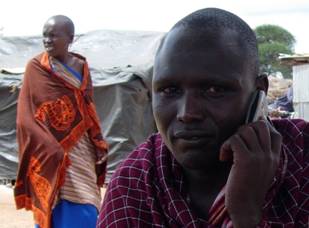
However, people also said that the radio provides greater articulation of the Maasai voice, not only for purposes of development and representation but also for challenging the status quo. The authorities sometimes view the latter as a potential source of political agitation.
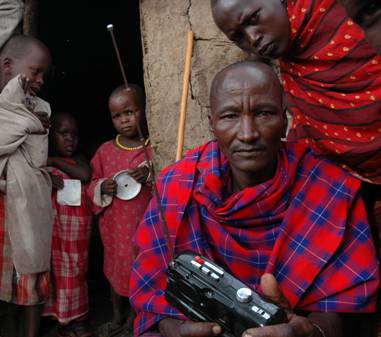
Information sharing is another aspect of life the Maasai cherish, especially because of its use of the Ki-Maasai language, as mentioned by one of the representatives of the council of elders:
Just as electricity powers households and streets in urban areas, ORS is the one which powers our local communities.
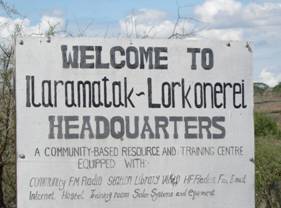
Evidence of Change 2: Preserving and promoting positive Maasai culture and traditions
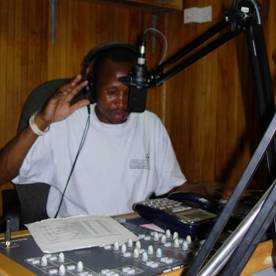
One of the most attractive things about ORS FM is the station’s emphasis on culture. Young and old alike are, for example, are attracted by traditional Maasai songs and folklore which the radio station airs. It generates a sense of pride among the people and it also contributed to people’s sense of identity.
Yet some in the community point to a number of practices on which there was consensus that they should be discouraged. One example of such a practice is Esoto the cultural dance held overnight where Maasai warriors engage in drinking alcohol and vigorous dancing with young girls—often leading to unwanted pregnancies and high rates of sexually transmitted disease. Esoto is also identified as a prime source of HIV transmission due to the promiscuous behaviour associated with the dance. Similarly, many argued that Oloip, another type of dance, which is undertaken outside of bomas (compounds) also leads to negative consequences.
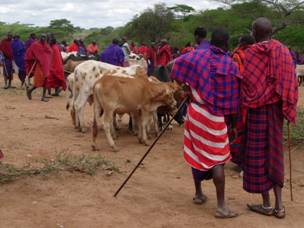
According to Martin Kariongi, founder of the Institute for Orkonerei Pastoralist’s Advancement (IOPA), there are a number of important, but often unrecognised, changes which have happened as a result of the radio. Such changes have also led to further advancement in communication and development among the Maasai people. A case in point is the growth of the Ki-Maasai language itself. Continuous discussion and debate have added new words, concepts and definitions to the language, which have in turn helped people to embrace a wider set of ideas and concepts.
Evidence of Change 3: Changing attitudes and accepting education for all Maasai children
As we drove through rugged terrain upon returning from a community consultation day, a female member of the ORS staff drew my attention to several small groups of school children who were excitedly giggling and walking home, books in bags, and seemingly proud in their blue-and-white uniforms. Three out of five of the groups were primarily girls. The ORS woman said:
When you see those little girls going to school in much the same way as do children in other communities, you feel elated. This looks like a miracle to some of us. Only a few years ago it was almost impossible to see so many girls in Maasai land going to school in such large numbers. Even when you did, it was unlikely that they would give you the impression that they actually enjoyed what they were doing. Now all that has changed. Although we cannot claim that all these achievements are 100 percent due to ORS, for sure we know and we have been told by community members and the children themselves that the radio has played a very important role.
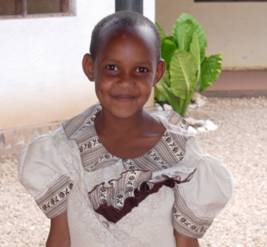
A school teacher talked about the amazing amount of achievement and progress which had been made with respect to acquisition of knowledge and understanding. He believed that through the radio there had been a significant increase in the stock of knowledge among the Maasai people. All local community members we interviewed for the study affirmed his viewpoint.
Radio KKCR, Uganda
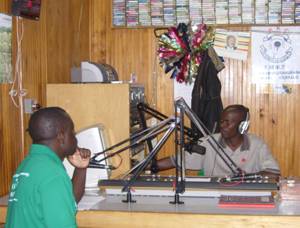
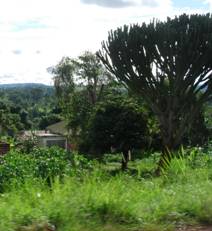
Amid the lush green, rolling hills of southwest Uganda, Radio KKCR’s broadcasts have helped transform lives and livelihoods for the better since 2000. The three most significant changes people of the area identified in their stories were: 1) knowing the value of information; 2) recognizing people’s rights; and 3) giving voice to the people.
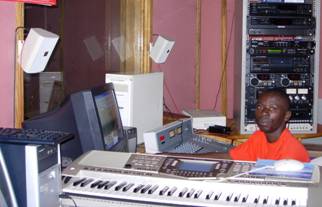
Evidence of Change 1: Knowing the value of information
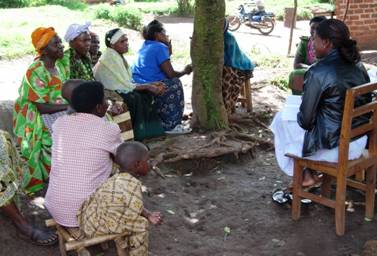
In a discussion with a group of women from the village of Igulika, a 50-year old woman said:
When the radio started—now it seems a long time ago—it changed my life, and a lot of aspects of my life and our life here. Just one area was that of hygiene. We learned about boiling water, about keeping our surroundings clean and protecting our water sources, using latrines and, in these and other ways, protecting our children from diseases. From the “Wake Up and Work” programme we learned that people—even with very small capital—could start selling greens in the market. And we learned that we could, with what we have available, cook and eat a balanced diet. How this has improved our life? Well, for one, we never lack salt, sugar, and paraffin for cooking, and we always have soap. This was not the case before! And all of this simply because of the new information!
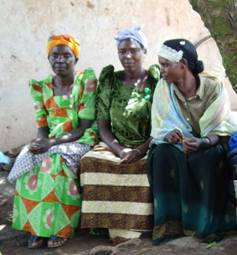
A second woman added:
Another big improvement and change in our lives, which has happened due to information—and is of big value in my life and in the life of the community—is the way in which the radio helps us keep in contact over big distances with relatives. Now we can easily ensure that they get the important family news needed. Also the radio is being used for other kinds of information of importance to us like immunization and other public announcements.
Evidence of Change 2: Recognizing people’s rights
According to the community at Kyakabadiima, human rights is “the mother of all important changes” that had resulted from the radio station. People cited examples where KKCR programmes on human rights had led to positive changes at both household and community levels:
We have learnt about our rights. That is it!
In this community the police used to behave as if they were completely above the law. If they wanted to extort money from you all they did was to arrest you and put you in detention without any charge or with very flimsy charges. We never thought even for a moment that there was a law which protected us as citizens.
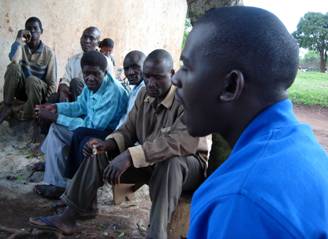
Since the programmes on radio started, now everyone knows that you cannot be detained for more than 28 hours without being charged. The most interesting thing for us now is that KKCR brings the top police officers to explain to us what they do, how they do it and why they do it. We then take turns to ask specific questions, including citing cases where there may have been abuses by the police in the past. This has changed the way the police work, and now one no longer hears of cases of unlawful detention. We know our rights.
Another example reflecting how people’s rights were being abused in the past was the frequent battering of women, especially after their spouses had been drinking. This problem has now been thwarted, first by the guidance given on a programme, which talks about household relations. This programme is reinforced with another one, which challenges women to know and invoke their rights. These days you even hear children on Sunday (in the children’s programme) talking about the need to protect children’s rights. Some are, for example, on record for having demanded to be taken to school following radio programmes which stipulate among others the right to education for all children.
Evidence of Change 3: Giving voice to the people
In the women’s group of Igulika, a younger woman said:
We have learned a lot through the radio, which has given me, and us, the power and confidence to speak up. The Functional Adult Literacy courses have taught me to read, write and also to talk in public. Now we, also women, can organize a meeting, meet and discuss and agree on important action needed. Earlier we had to either write a letter—but it would take forever for it to arrive—or we would use drumming, using different sounds of the drum for different messages. With the radio, this is all a lot faster, reaches further and is more reliable.
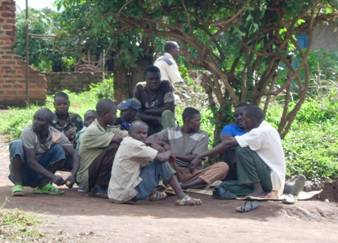
An elder of Igulika told how KCRR had improved unity in his community:
The radio does not distinguish between who is talking. And by giving a voice to all people living in its area, the radio has started to create unity, to make differences and diminish tension. Originally the rich in the town could not see why the radio should start. But even they now realize how important it is, especially for us living in the rural areas and these very small villages. And by hearing each other talk, rich and poor, we are starting to realize that we have interests in common, and in general it has created more unity. We are all under the same umbrella – the umbrella of the radio.
Another elder added:
In this area we had a lot of conflicts in the past, tribal and others. Now, through the radio, we hear a lot from each other, we work together, and by all of us having, in this way, a voice, we have come to co-exist peacefully. This is due to the radio!
The Power of Stories
I based this story on stories told to my colleague and me by people in the communities surrounding three East African community radio stations. Our analysis of these powerful stories of change demonstrates how community radio is a powerful tool for communication for social change.
Community radio broadens horizons, changes attitudes, enhances unity, encourages education for all children, shares information and presents role models, inspires creativity, spurs debate and, most important, provides voice to people and communities.
I am especially thankful to the following:
SIDA, the Swedish International Development Agency, and Grace Githaiga, coordinator of the regional network for Econews Africa, based in Nairobi. Both organisations approved the use of the stories documented above;
Jessica Dart and Rick Davies, who put the work around the story-based impact assessment tool into a methodological handbook; and to
The Communication for Social Change Consortium, who apply MSC concepts in their participatory monitoring and evlauation work, and urge others to use such approaches in their three seminal publlications: Who Measures Change?, Communities Measure Change and Measuring Change (These and other publications are avvaialble through the CFSC Consortium Web site: www.communicationforsocialchange.org.)
For more background on the three radio stations:
*ORS-FM, a Maasai radio station in northern Tanzania, click here
*Radio Mang’elete, a women's radio station in south-eastern Kenya, click here
*Radio KKCR, a rural community radio station in Southwestern Uganda, click here
And on the Most Significant Change methodology:
* http://www.mande.co.uk/docs/MSCGuide.htm